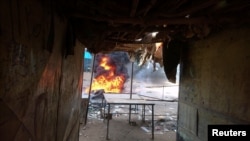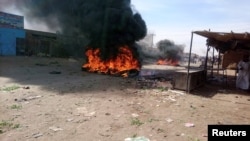A state of emergency has been declared in two eastern Sudan states after at least eight protesters were killed in mass demonstrations against rising prices.
Thousands of protesters marched in cities and towns across Sudan Thursday, angry over widespread corruption and the rising costs of basic goods, including bread.
Eyewitnesses in al-Qadarif said men wearing uniforms were among the protesters. Prices for food have skyrocketed in recent months, with inflation topping 60 percent. This comes after the government cut subsidies earlier this year.
Protesters there torched government buildings, including the headquarters of the ruling National Congress Party. Eyewitnesses in Atbara say the building was burned to the ground.
States of emergency were declared in the cities of al-Qadarif and Atbara.
Some of the Sudanese protesters are demanding a regime change. Many say they cannot earn a living or pay for basic needs like bread and fuel.
A Khartoum resident said students were planning to stage more protests Thursday around Khartoum University, but government security agents intervened and the students were ordered off the streets.
Police fired tear gas at hundreds of protesters within a kilometer of the presidential palace in Khartoum. Demonstrations were reported in Atbara, Port Sudan, Barbar, Nohoud and other cities.
The economy has deteriorated over the past several years after South Sudan became independent, depriving Khartoum of much of its oil revenue.
Carol Van Dam Falk and Kenneth Schwartz contributed.





